World Economic Forum
The World Economic Forum (WEF), based in Cologny-Geneva, Switzerland, is an NGO, founded in 1971. The WEF's mission is cited as "committed to improving the state of the world by engaging business, political, academic, and other leaders of society to shape global, regional, and industry agendas".[1] It is a membership-based organization, and membership is made up of the world's largest corporations.[2]
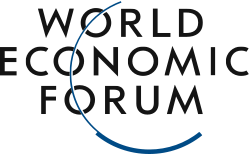 | |
.jpg) Headquarters in Cologny, Switzerland. | |
| Motto | Committed to improving the state of the world |
|---|---|
| Formation | January 1971 (as European Management Forum) |
| Founder | Klaus Schwab |
| Type | Nonprofit organization |
| Legal status | Foundation |
| Purpose | International Organization for Public-Private Cooperation |
| Headquarters | Cologny, Switzerland |
Region served | Worldwide |
Official language | English |
| Klaus Schwab | |
| Website | www |
Formerly called | European Management Forum |
The WEF hosts an annual meeting at the end of January in Davos, a mountain resort in Graubünden, in the eastern Alps region of Switzerland. The meeting brings together some 3,000 business leaders, international political leaders, economists, celebrities and journalists for up to five days to discuss global issues, across 500 public and private sessions.
The organization also convenes some six to eight regional meetings each year in locations across Africa, East Asia, Latin America, and India and holds two further annual meetings in China and the United Arab Emirates. Beside meetings, the organization provides a platform for leaders from all stakeholder groups from around the world – business, government and civil society – to collaborate on multiple projects and initiatives.[3] It also produces a series of reports and engages its members in sector-specific initiatives.[4]
Due to its prominence as an international community of leaders from business, politics, arts and media, the World Economic Forum and particularly its annual meeting in Davos are among others criticised regarding the public cost of security, the formation of a wealthy global elite without attachment points to the broader societies, undemocratic decision processes, gender issues and a lack of financial transparency.
History
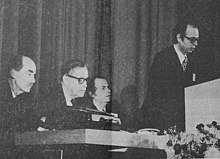
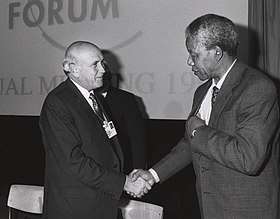
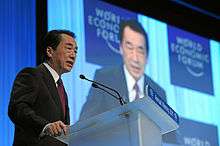
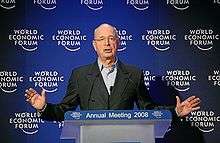
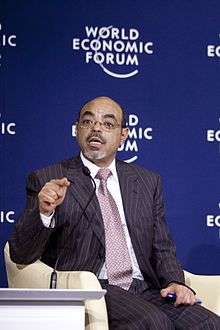
The WEF was founded in 1971 by Klaus Schwab, a business professor at the University of Geneva.[5] First named the European Management Forum, it changed its name to the World Economic Forum in 1987 and sought to broaden its vision to include providing a platform for resolving international conflicts.
In the summer of 1971, Schwab invited 444 executives from Western European firms to the first European Management Symposium held in the Davos Congress Centre under the patronage of the European Commission and European industrial associations, where Schwab sought to introduce European firms to American management practices. He then founded the WEF as a nonprofit organization based in Geneva and drew European business leaders to Davos for the annual meetings each January.[6]
Events in 1973, including the collapse of the Bretton Woods fixed-exchange rate mechanism and the Arab–Israeli War, saw the annual meeting expand its focus from management to economic and social issues, and, for the first time, political leaders were invited to the annual meeting in January 1974.[7]
Political leaders soon began to use the annual meeting as venue for promoting their interests. The Davos Declaration was signed in 1988 by Greece and Turkey, helping them turn back from the brink of war. In 1992, South African President F. W. de Klerk met with Nelson Mandela and Chief Mangosuthu Buthelezi at the annual meeting, their first joint appearance outside South Africa. At the 1994 annual meeting, Israeli Foreign Minister Shimon Peres and PLO chairman Yasser Arafat reached a draft agreement on Gaza and Jericho.[8]
In October 2004, the World Economic Forum gained attention through the resignation of its CEO[9] and executive director José María Figueres over the undeclared receipt of more than USD 900,000 in consultancy fees from the French telecommunications firm Alcatel.[10]
In January 2006, the WEF published an article in its Global Agenda magazine titled ”Boycott Israel”, which was distributed to all 2,340 participants of the Annual Meeting.[11] Following the publication, the WEF excused the publication as "an unacceptable failure in the editorial process".[12]
In late 2015, the invitation was extended to include a North Korean delegation for the 2016 WEF, "in view of positive signs coming out of the country", the WEF organizers noted. North Korea has not been attending the WEF since 1998. The invitation was accepted but after the January 2016 North Korean nuclear test on 6 January, the invitation was revoked, and the country's delegation was made subject to "existing and possible forthcoming sanctions".[13] Despite protests by North Korea calling the decision by the WEF managing board a "sudden and irresponsible" move, the WEF committee maintained the exclusion because "under these circumstances there would be no opportunity for international dialogue".[14]
In 2017, the WEF in Davos attracted considerable attention when for the first time, a head of state from the People's Republic of China was present at the alpine resort. With the backdrop of Brexit, an incoming protectionist US administration and significant pressures on free trade zones and trade agreements, Paramount leader Xi Jinping defended the global economic scheme, and portrayed China as a responsible nation and a leader for environmental causes. He sharply rebuked the current populist movements that would introduce tariffs and hinder global commerce, warning that such protectionism could foster isolation and reduced economic opportunity.[15]
In 2018, Indian Prime Minister Narendra Modi gave the plenary speech, becoming the first head of state from India to deliver the inaugural keynote for the annual meet at Davos. Modi highlighted global warming (climate change), terrorism and protectionism as the three major global challenges, and expressed confidence that they can be tackled with collective effort.[16]
In 2019, Brazilian President Jair Bolsonaro gave the keynote address at the plenary session of the conference. On his first international trip to Davos, he emphasized liberal economic policies despite his populist agenda, and attempted to reassure the world that Brazil is a protector of the rain forest while utilizing its resources for food production and export. He stated that "his government will seek to better integrate Brazil into the world by mainstreaming international best practices, such as those adopted and promoted by the OECD".[17] Environmental concerns like extreme weather events, and the failure of climate change mitigation and adaptation were among the top-ranking global risks expressed by WEF attendees.[18]
In 2020, the Swiss police made the public aware that two "Russian spies", one of which was disguised as a plumber, had travelled to Davos with diplomatic passports prior to the Annual Meeting. The Russian Embassy in Bern denied having carried out “preparatory work” for spying on the World Economic Forum.[19][20]
Organization
Headquartered in Cologny, the WEF also has offices in New York, Beijing and Tokyo. In January 2015 it was designated an NGO with "other international body" status by the Swiss Federal Government under the Swiss Host-State Act.[21]
On October 10, 2016, the WEF announced the opening of its new Center for the Fourth Industrial Revolution in San Francisco. According to the WEF, the center will "serve as a platform for interaction, insight and impact on the scientific and technological changes that are changing the way we live, work and relate to one another".[22]
The World Economic Forum claims to be impartial and that it is not tied to any political, partisan, or national interests. Until 2012, it had observer status with the United Nations Economic and Social Council, when it was revoked; it is under the supervision of the Swiss Federal Council. The foundation's highest governance body is the foundation board.[23]
The WEF is chaired by Founder and Executive Chairman Professor Klaus Schwab and is guided by a Board of Trustees that is made up of leaders from business, politics, academia and civil society. Members of the Board of Trustees include: Mukesh Ambani, Marc Benioff, Peter Brabeck-Letmathe, Mark Carney, Laurence D. Fink, Chrystia Freeland, Orit Gadiesh, Fabiola Gianotti, Al Gore, Herman Gref, José Ángel Gurría, André Hoffmann, Christine Lagarde, Jack Ma, Yo-Yo Ma, Peter Maurer, Luis Alberto Moreno, Muriel Pénicaud, H.M. Queen Rania Al Abdullah of the Hashemite Kingdom of Jordan, L. Rafael Reif, David M. Rubenstein, Mark Schneider, Klaus Schwab, Tharman Shanmugaratnam, Jim Hagemann Snabe, Feike Sijbesma, Heizo Takenaka, Zhu Min.[24]
The Managing Board is chaired by the WEF's President, Børge Brende, and acts as the executive body of the World Economic Forum. Managing Board members are Emma Benameur, Børge Brende, Julien Gattoni, W. Lee Howell, Jeremy Jurgens, Anil Menon, Adrian Monck, Sarita Nayyar, Richard Samans, Olivier M. Schwab, Murat Sönmez, Dominic Kailash Nath Waughray, Saadia Zahidi, Alois Zwinggi.[25]
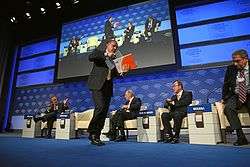
Membership
The foundation is funded by its 1,000 member companies, typically global enterprises with more than five billion dollars in turnover (varying by industry and region). These enterprises rank among the top companies within their industry and/or country and play a leading role in shaping the future of their industry and/or region. Membership is stratified by the level of engagement with forum activities, with the level of membership fees increasing as participation in meetings, projects, and initiatives rises.[26] In 2011 an annual membership cost $52,000 for an individual member, $263,000 for "Industry Partner" and $527,000 for "Strategic Partner". An admission fee cost $19,000 per person.[27] In 2014, WEF raised annual fees by 20 percent, bringing the cost for "Strategic Partner" from CHF 500,000 ($523,000) to CHF 600,000 ($628,000).[28]
Activities
Annual meeting in Davos
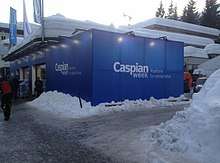
The flagship event of the World Economic Forum is the invitation-only annual meeting held at the end of January in Davos, Switzerland, bringing together chief executive officers from its 1,000 member companies, as well as selected politicians, representatives from academia, NGOs, religious leaders, and the media in an alpine environment. The winter discussions ostensibly focus around key issues of global concern (such as the globalization, capital markets, wealth management, international conflicts, environmental problems and their possible solutions).[4][29] The participants are also taking part in role playing events, such as the Investment Heat Map.[30] Informal winter meetings may have led to as many ideas and solutions as the official sessions.[31]
At the 2018 annual meeting, more than 3,000 participants from nearly 110 countries participated in over 400 sessions. Participation included more than 340 public figures, including more than 70 heads of state and government and 45 heads of international organizations; 230 media representatives and almost 40 cultural leaders were represented.[32]
As many as 500 journalists from online, print, radio, and television take part, with access to all sessions in the official program, some of which are also webcast.[33] Not all the journalists are given access to all areas, however. This is reserved for white badge holders. "Davos runs an almost caste-like system of badges", according to BBC journalist Anthony Reuben. "A white badge means you're one of the delegates – you might be the chief executive of a company or the leader of a country (although that would also get you a little holographic sticker to add to your badge), or a senior journalist. An orange badge means you're just a run-of-the-mill working journalist."[34] All plenary debates from the annual meeting also are available on YouTube[35] while photographs are available on Flickr.[36][37]
| Year | Dates | Theme |
|---|---|---|
| 1988 | The new state of the world economy | |
| 1989 | Key developments in the 90s: implications for global business | |
| 1990 | Competitive cooperation in a decade of turbulence | |
| 1991 | The new direction for global leadership | |
| 1992 | Global cooperation and megacompetition | |
| 1993 | Rallying all the forces for global recovery | |
| 1994 | Redefining the basic assumptions of the world economy | |
| 1995 | Leadership for challenges beyond growth | |
| 1996 | Sustaining globalization | |
| 1997 | Building the network society | |
| 1998 | Managing volatility and priorities for the 21st century | |
| 1999 | Responsible globality: managing the impact of globalization | |
| 2000 | New beginnings: making a difference | |
| 2001 | 25–30 January | Sustaining growth and bridging the divides: a framework for our global future |
| 2002 | 31 January – 4 February | Leadership in fragile times |
| 2003 | 21–25 January | Building trust |
| 2004 | 21–25 January | Partnering for security and prosperity |
| 2005 | 26–30 January | Taking responsibility for tough choices |
| 2006 | 25–29 January | The creative imperative[38] |
| 2007 | 24–28 January | Shaping the global agenda, the shifting power equation |
| 2008 | 23–27 January | The power of collaborative innovation |
| 2009 | 28 January – 1 February | Shaping the post-crisis world |
| 2010 | 27–30 January | Improve the state of the world: rethink, redesign, rebuild |
| 2011 | 26–30 January | Shared norms for the new reality |
| 2012 | 25–29 January | The great transformation: shaping new models |
| 2013 | 23–27 January | Resilient dynamism[39] |
| 2014 | 22–25 January | The reshaping of the world: consequences for society, politics and business |
| 2015 | 21–24 January | New global context |
| 2016 | 20–23 January | Mastering the fourth industrial revolution |
| 2017 | 17–20 January | Responsive and responsible leadership |
| 2018 | 23–26 January | Creating a shared future in a fractured world |
| 2019 | 22–25 January | Globalization 4.0: shaping a global architecture in the age of the fourth industrial revolution |
| 2020 | 20–24 January | Stakeholders for a cohesive and sustainable world[40] |
Individual Participants
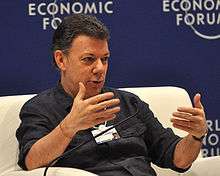
Some 3,000 individual participants joined the 2020 annual meeting in Davos. Countries with the most attendees include the United States (674 participants), the United Kingdom (270), Switzerland (159), Germany (137) and India (133).[41] Among the attendees were heads of state or government, cabinet ministers, ambassadors, heads or senior officials of international organizations) attended the annual meeting, including: Sanna Marin (Prime Minister of Finland), Ursula von der Leyen (President of the European Commission), Christine Lagarde (ECB President), Greta Thunberg (climate activist), Ren Zhengfei (Huawei Technologies founder), Kristalina Georgieva (Managing director of the IMF), Deepika Padukone (Bollywood star), George Soros (investor) and Donald Trump (President of the United States).[42]
An analysis by The Economist from 2014 found that the vast majority of participants is male and more than 50 years old. Business accounts for most of the participants' background (1,595 conference attendees) with the remaining seats shared between government (364), NGOs (246) and press (234). Academia, which had been the basis of the first annual conference in 1971, had been marginalised to the smallest participant group (183 attendees). [43]
Corporate Participants
Next to individual participants, the World Economic Forum maintains a dense network of corporate partners that can apply for different partnership ranks within the forum.[44] For 2019, Bloomberg has identified a total of 436 listed corporates that participated in the Annual Meeting while measuring a stock underperformance by the Davos participants of c. -10% versus the S&P 500 during the same year. Drivers are among others an overrepresentation of financial companies and an underrepresentation of fast-growing health care and information technology businesses at the conference.[45] The Economist had found similar results in an earlier study, showing an underperformance of Davos participants against both the MSCI World Index and the S&P 500 between 2009 and 2014.[46]
Summer annual meeting
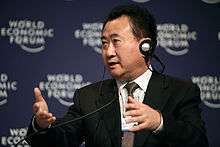
In 2007, the foundation established the Annual Meeting of the New Champions (also called Summer Davos), held annually in China, alternating between Dalian and Tianjin, bringing together 1,500 participants from what the foundation calls Global Growth Companies, primarily from rapidly growing emerging countries such as China, India, Russia, Mexico, and Brazil, but also including quickly growing companies from developed countries. The meeting also engages with the next generation of global leaders from fast-growing regions and competitive cities, as well as technology pioneers from around the globe.[47][48] The Premier of China has delivered a plenary address at each annual meeting.
Regional meetings
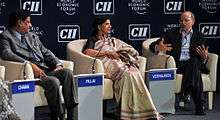
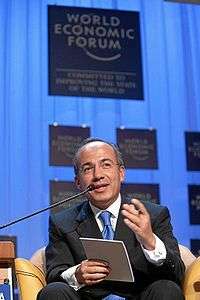
Every year regional meetings take place, enabling close contact among corporate business leaders, local government leaders, and NGOs. Meetings are held in Africa, East Asia, Latin America, and the Middle East. The mix of hosting countries varies from year to year, but consistently China and India have hosted throughout the decade since 2000.[49]
Young Global Leaders
The group of Young Global Leaders[50] consists of 800 people chosen by the WEF organizers as being representative of contemporary leadership, "coming from all regions of the world and representing all stakeholders in society", according to the organization. After five years of participation they are considered alumni.
Social Entrepreneurs
Since 2000, the WEF has been promoting models developed by those in close collaboration with the Schwab Foundation for Social Entrepreneurship,[51] highlighting social entrepreneurship as a key element to advance societies and address social problems.[52][53] Selected social entrepreneurs are invited to participate in the foundation's regional meetings and the annual meetings where they may meet chief executives and senior government officials. At the Annual Meeting 2003, for example, Jeroo Billimoria met with Roberto Blois, deputy secretary-general of the International Telecommunication Union, an encounter that produced a key partnership for her organization Child helpline international.[54]
Research reports
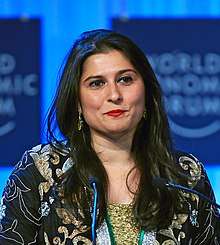
The foundation also acts as a think tank, publishing a wide range of reports. In particular, "Strategic Insight Teams" focus on producing reports of relevance in the fields of competitiveness, global risks, and scenario thinking.
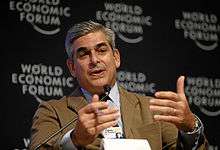
The "Competitiveness Team"[55] produces a range of annual economic reports (first published in brackets): the Global Competitiveness Report (1979) measured competitiveness of countries and economies; The Global Information Technology Report (2001) assessed their competitiveness based on their IT readiness; the Global Gender Gap Report examined critical areas of inequality between men and women; the Global Risks Report (2006) assessed key global risks; the Global Travel and Tourism Report (2007) measured travel and tourism competitiveness; the Financial Development Report (2008)[56] aimed to provide a comprehensive means for countries to establish benchmarks for various aspects of their financial systems and establish priorities for improvement; and the Global Enabling Trade Report (2008) presented a cross-country analysis of the large number of measures facilitating trade among nations.[57]
The "Risk Response Network"[58] produces a yearly report assessing risks which are deemed to be within the scope of these teams, have cross-industry relevance, are uncertain, have the potential to cause upwards of US$10 billion in economic damage, have the potential to cause major human suffering, and which require a multi-stakeholder approach for mitigation.[59]
In the year 2020 the forum published a report named: "Nature Risk Rising". In this report the forum estimated that approximately half of the global GDP is dependent higly or moderately on nature and 1 dollar putted on nature restoration yields 9 dollars in profit.[60][61]
Initiatives
Health
The Global Health Initiative was launched by Kofi Annan at the annual meeting in 2002. The GHI's mission was to engage businesses in public-private partnerships to tackle HIV/AIDS, tuberculosis, malaria, and health systems.
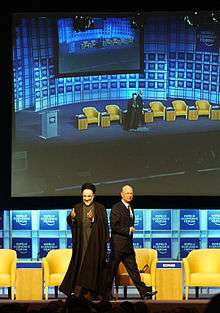
The Global Education Initiative (GEI), launched during the annual meeting in 2003, brought together international IT companies and governments in Jordan, Egypt, and India[62] that has resulted in new personal computer hardware being available in their classrooms and more local teachers trained in e-learning. The GEI model, which is scalable and sustainable, now is being used as an educational blueprint in other countries including Rwanda.
On 19 January 2017 the Coalition for Epidemic Preparedness Innovations (CEPI), a global initiative to fight epidemics, was launched at WEF in Davos. The internationally funded initiative aims at securing vaccine supplies for global emergencies and pandemics, and to research new vaccines for tropical diseases, that are now more menacing. The project is funded by private and governmental donors, with an initial investment of US$460m from the governments of Germany, Japan and Norway, plus the Bill & Melinda Gates Foundation and the Wellcome Trust.[63]
2020 Meeting
Between January 21-24th, at the early stages of the COVID-19 outbreak, CEPI met with leaders from Moderna to establish plans for a COVID-19 vaccine at the Davos gathering. [64] with a total global case number of 274 and total loss of life the virus at 16. [65]
The WHO declared a global health emergency 6 days later. [66]
Society
The Water Initiative brings together diverse stakeholders such as Alcan Inc., the Swiss Agency for Development and Cooperation, USAID India, UNDP India, Confederation of Indian Industry (CII), Government of Rajasthan, and the NEPAD Business Foundation to develop public-private partnerships on water management in South Africa and India.
In an effort to combat corruption, the Partnering Against Corruption Initiative (PACI) was launched by CEOs from the Engineering and Construction, Energy and Metals, and Mining industries at the annual meeting in Davos during January 2004. PACI is a platform for peer exchange on practical experience and dilemma situations. Approximately 140 companies have joined the initiative.[67]
Environment
In the beginning of the 21th century the forum begun to increasingly deal with environmental issues.[68] In the Davos Manifesto 2020 it is said that a company among other:
"acts as a steward of the environmental and material universe for future generations. It consciously protects our biosphere and champions a circular, shared and regenerative economy."
"responsibly manages near-term, medium-term and long-term value creation in pursuit of sustainable shareholder returns that do not sacrifice the future for the present."
"is more than an economic unit generating wealth. It fulfils human and societal aspirations as part of the broader social system. Performance must be measured not only on the return to shareholders, but also on how it achieves its environmental, social and good governance objectives."[69]
The Environmental Initiative covers climate change and water issues. Under the Gleneagles Dialogue on Climate Change, the U.K. government asked the World Economic Forum at the G8 Summit in Gleneagles in 2005 to facilitate a dialogue with the business community to develop recommendations for reducing greenhouse gas emissions. This set of recommendations, endorsed by a global group of CEOs, was presented to leaders ahead of the G8 Summit in Toyako and Hokkaido held in July 2008.[70][71]
In 2016 WEF published an article in which it is said, that in some cases reducing consumption can increase the life level. In the article is mentioned that in Costa Rica the GDP is 4 times smaller than in many countries in Western Europe and North America, but people live longer and better. An American study shows that when the income is higher than 75,000$, an increase in profits does not increase well being. For better measuring the well being, the New Economics Foundation’s has launched the Happy Planet Index.[72].
In January 2017, WEF launched the 'Platform for Accelerating the Circular Economy' (PACE), which is a global public private partnership seeking to scale circular economy innovations.[73][74] PACE is co-chaired by Frans van Houten (CEO of Philips), Naoko Ishii (CEO of the Global Environment Facility, and the head of United Nations Environment Programme (UNEP).[75] The Ellen MacArthur Foundation, the International Resource Panel, Circle Economy and Accenture serve as knowledge partners.
The Forum emphasized its 'Environment and Natural Resource Security Initiative' for the 2017 meeting to achieve inclusive economic growth and sustainable practices for global industries. With increasing limitations on world trade through national interests and trade barriers, the WEF has moved towards a more sensitive and socially minded approach for global businesses with a focus on the reduction of carbon emissions in China and other large industrial nations.[76]
Also in 2017, WEF launched the Fourth Industrial Revolution (4IR) for the Earth Initiative, a collaboration among WEF, Stanford University and PwC, and funded through the Mava Foundation.[77] In 2018, WEF announced that one project within this initiative was to be the Earth BioGenome Project, the aim of which is to sequence the genomes of every organism on Earth.[78]
The World Economic Forum is working to eliminate plastic pollution, stating that by the year 2050 it will consume 15% of the global carbon budget and will pass by its weight fishes in the world's oceans. One of the methods is to achieve circular economy[79][80].
The theme of 2020 World Economic Forum annual meeting was "Stakeholders for a Cohesive and Sustainable World". Climate change and sustainability were central themes of discussion. Many argued that GDP is failed to represent correctly the wellbeing and that fossil fuel subsidies should be stopped. Many of the participants said that a better capitalism is needed. Al Gore summarized the ideas in the conference as: “I don’t want to be naive, but I want to acknowledge that the center of the global economy is now saying things that many of us have dreamed they might for a long time,” "“The version of capitalism we have today in our world must be reformed,”.[81]
In this meeting the World Economic Forum:
- Launched the Trillion Tree Campaign an initiative aiming to "grow, restore and conserve 1 trillion trees over the next 10 years around the world - in a bid to restore biodiversity and help fight climate change". Donald Trump joined the initiative. The forum stated that: "Nature-based solutions – locking-up carbon in the world’s forests, grasslands and wetlands – can provide up to one-third of the emissions reductions required by 2030 to meet the Paris Agreement targets," adding that the rest should come from the heavy industry, finance and transportation sectors. One of the targets is to unify existing reforestation projects[82]
- Discussed the issue of climate change and called to expanding renewable energy, energy efficiency change the patterns of consumption and remove carbon from the atmosphere. The forum claimed that the climate crisis will became a climate apocalypse if the temperature will rise by 2 degree. The forum called to fulfill the commitments in Paris Agreement. Jennifer Morgan the executive director of Greenpeace said that as to the beginning of the forum, fossil fuels still get 3 times more money than climate solutions[83]
Coronavirus and Green recovery
In April 2020, the forum published an article that postulates that the COVID-19 pandemic is linked to the destruction of nature. The number of emerging diseases is rising and this rise is linked to Deforestation and Species loss. In the article there are multiple examples of the degradation of ecological systems caused by humans. It is also says that half of the global GDP is moderately or largely dependent on nature. The article concludes that the recovery from the pandemic should be linked to nature recovery.[84]
The forum proposed a plan for a Green recovery. The plan includes advancing Circular economy. Among the mentioned methods, there is Green building, Sustainable transport, Organic farming, Urban open space, Renewable energy and Electric vehicles[85] .
Global Future Councils
The Network of Global Future Councils meets annually in the United Arab Emirates and virtually several times a year.[86] The second WEF annual meeting was held in Dubai in November 2017, when there were 35 distinct councils focused on a specific issue, industry or technology.[87] In 2017 members met with representatives and partners of WEF's new Center for the Fourth Industrial Revolution.[88] Ideas and proposals are taken forward for further discussion at the World Economic Forum Annual Meeting in Davos-Klosters in January.[87]
Future of Work
In regards to the Future of Work, the 2020 WEF set the goal of providing better jobs, access to higher quality education and skills to 1 billion people by 2030. [89]
Criticism
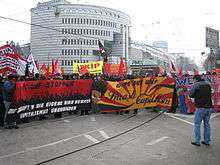
During the late 1990s the foundation, along with the G7, World Bank, World Trade Organization, and International Monetary Fund, came under heavy criticism by anti-globalization activists who claimed that capitalism and globalization were increasing poverty and destroying the environment. Ten thousand demonstrators disrupted a regional meeting of the World Economic Forum in Melbourne, obstructing the path of two hundred delegates to the meeting.[90] Small demonstrations are held in Davos on most but not all years, organised by the local Green Party (see Anti-WEF protests in Switzerland, January 2003) to protest against what have been called the meetings of "fat cats in the snow", a tongue-in-cheek term used by rock singer Bono.[91]
After 2014, the protest movement against the World Economic Forum largely died down, and Swiss police noted a significant decline in attending protesters, 20 at most during the meeting in 2016. While protesters are still more numerous in large Swiss cities, the protest movement itself has undergone significant change.[92] Around 150 Tibetans and Uighurs protested in Geneva and 400 Tibetans in Bern against the visit of the China's paramount leader Xi Jinping for the 2017 meeting, with subsequent confrontations and arrests.[93]
Growing wealth gaps
A number of NGOs have used the World Economic Forum to highlight growing inequalities and wealth gaps. Winnie Byanyima, the executive director of the anti-poverty confederation Oxfam International co-chaired the 2015 meeting, where she presented a critical report of global wealth distribution based on statistical research by the Credit Suisse Research Institute. In this study, the richest one percent of people in the world own forty-eight percent of the world's wealth.[94] At the 2019 meeting, she presented another report claiming that the gap between rich and poor has only increased. The report “Public Good or Private Wealth” stated that 2,200 billionaires worldwide saw their wealth grow by 12 percent while the poorest half saw its wealth fall by 11 percent. Oxfam calls for a global tax overhaul to increase and harmonise global tax rates for corporations and wealthy individuals.[95]
Public cost of security
In September 2018, the city of Davos approved by popular vote to increase the security budget for the yearly meeting to CHF 1.125 million. Later that month, the Swiss house of representatives (Nationalrat) also agreed to increase police and military expenditures to CHF 39 million while the Kanton of Graubünden contributes CHF 2.25 million, the same amount the WEF is paying for security costs.[96] The Aargauer Zeitung argued in January 2020 that the actual cost borne by the Kanton Graubünden stand at CHF 9 million per year.[97]
Private vs public meetings
Since the annual meeting in January 2003 in Davos, an Open Forum Davos,[98] which was co-organized by the Federation of Swiss Protestant Churches, is held concurrently with the Davos forum, opening up the debate about globalization to the general public. The Open Forum has been held in the local high school every year, featuring top politicians and business leaders. It is open to all members of the public free of charge.[99][100]
"Davos Man"
"Davos Man" is a neologism referring to the global elite of wealthy (predominantly) men, whose members view themselves as completely "international". According to political scientist Samuel P. Huntington, who is credited with inventing the phrase "Davos Man",[101] they are people who "have little need for national loyalty, view national boundaries as obstacles that thankfully are vanishing, and see national governments as residues from the past whose only useful function is to facilitate the élite's global operations". In his 2004 article "Dead Souls: The Denationalization of the American Elite", Huntington argues that this international perspective is a minority elitist position not shared by the nationalist majority of the people.[102]
In 2019, the Manager Magazin journalist Henrik Müller argued that the "Davos Man" had already decayed into different groups and camps. He sees three central drivers for this development:[103]
- Ideologically: the liberal western model is no longer considered a universal role model that other countries strive for (with China's digital totalitarianism or the traditional absolutism in the Persian Gulf as counter-proposals, all of which are represented by government members in Davos).
- Socially: societies increasingly disintegrate into different groups, each of which evokes its own identity (e.g. embodied through the Brexit vote or congressional blockades in the USA).
- Economically: the measured economic reality largely contradicts the established ideas of how the economy should actually work (despite economic upswings, wages and prices e.g. barely rise).
Gender debate
Since 2011, the World Economic Forum has been addressing its very own gender quota, to introduce at least one woman for every five senior executives that attended. Female participation increased from 9% to 15% between 2001 and 2005. In 2016, 18% of the WEF attendees were female; this number increased to 21% in 2017, and 24% in 2020, five years of growth.[104][105] Several women have since shared their personal impressions of the Davos meetings in media articles, highlighting that issues were more profound than "a quota at Davos for female leaders or a session on diversity and inclusion".[106][107][108] The World Economic Forum has in this context filed legal complaints against at least three investigative articles by reporters Katie Gibbons and Billy Kenber that were published by the British newspaper The Times in March 2020.
Undemocratic decision making
According to the European Parliament's Think Tank, critics see the WEF as an instrument for political and business leaders to 'take decisions without having to account to their electorate or shareholders'.[109]
Lack of financial transparency
In 2017, the former FAZ-Journalist Jürgen Dunsch criticized that financial reports of the WEF were not very transparent since neither income nor expenditures were broken down. In addition, he outlined that the foundation capital was not quantified while the apparently not insignificant profits would be reinvested.[110] Recent annual reports published by the WEF include a more detailed breakdown of its financials and indicate revenues of SFr 349 million for the year 2019 with reserves of SFr 310 million and a foundation capital of SFr 34 million. There are no further details provided to what asset classes or individual names the WEF allocates its financial assets of SFr 261 million.[111]
COVID-19 pandemic coverage
The WEF has a broad coverage of the COVID-19 pandemic by reflecting on scientific findings, government strategies as well as general pandemic and health advice.[112] Some articles published by the WEF at an early stage of the pandemic were written in a very favorable tone regarding the Chinese management of the health crisis. In March 2020, the WEF issued a text highlighting that "China has done an incredible job at slowing the spread of the virus" and that the WEF's Director for China was "impressed to see the delicate balancing act the Chinese government is doing between getting the economy growing again and protecting public health."[113] This was in contrast with criticism elsewhere of the Chinese government's COVID-19 information policy and data accuracy, which had been publicly flagged by a number of Western officials in February.[114][115]
Selective coverage of protests
Concerning societal bottom-up movements such as the George Floyd protests in the United States[116][117][118] or the gilets jaunes movement that originated in France,[119][120] the World Economic Forum ensures a detailed coverage of underlying protest drivers, views and statistics.[121] This contrasts the representation of movements such as the democracy protests in Hong Kong, which have received comparably marginal attention and have mostly been reviewed in the context of economic risk assessments.[122][123]
See also
References
- "World Economic Forum: Our Mission".
- "World Economic Forum: Our Members and Partners".
- "World Economic Forum: Our Platforms".
- Pigman. pp. 41–42.
- Pigman. pp. 6–22.
- Kellerman. p. 229.
- (registration required) "Interview: Klaus Schwab" Archived 4 June 2009 at the Wayback Machine.Financial Times. 22 January 2008. Retrieved 29 August 2008.
- Lowe, Felix (14 January 2008). "WEF and Davos: A Brief History" Archived 3 April 2008 at the Wayback Machine. The Telegraph. Retrieved 25 January 2011.
- "CEO resigns".
- "WEF director resigns over undeclared fees".
- "Scandal At Davos".
- Nussbaum, Bruce. "Scandal At DavosThe Scandal at Davos".
- Keaten Jamey, AP (13 January 2016). "World Economic Forum revokes invitation to North Korea to attend the annual meeting in Davos" Archived 11 October 2016 at the Wayback Machine. U.S. News & World Report. Retrieved 14 January 2016.
- AFP (15 January 2016). N. Korean fury over 'sinister' WEF Davos forum exclusion Archived 7 October 2016 at the Wayback Machine. The China Post. Retrieved 15 January 2016.
- P. S. Goodman (2017). "In Era of Trump, China’s President Champions Economic Globalization". The New York Times (News Analysis). Retrieved 17 January 2017.
- Livemint (23 January 2018). "WEF Davos 2018 highlights: Narendra Modi warns of three global threats". livemint.com/. Retrieved 8 February 2018.
- Speech by the President of the Republic, Jair Bolsonaro, at the Plenary Session of the World Economic Forum – Davos, Switzerland, January 22, 2019. Brasil. Ministry of Foreign Affairs. Retrieved 22 January 2019.
- Taylor, Chloe (Jan 2019). Global tension is hampering our ability to fight climate change, Davos survey warns CNBC. Retrieved 22 January 2019.
- "Swiss police 'exposed Russian spies in Davos'".
- "Swiss police found 'Russian spies' in Davos last year".
- "Press Release: World Economic Forum Gains Formal Status in Switzerland". 23 January 2015.
- "New Forum Center to Advance Global Cooperation on Fourth Industrial Revolution". World Economic Forum. Retrieved 20 November 2016.
- "The Leadership Team | World Economic Forum-The Leadership Team". Weforum.org. Retrieved 22 January 2012.
- "World Economic Forum, Leadership and Governance". Retrieved 20 November 2019.
- "World Economic Forum, Governance and Leadership". Retrieved 20 November 2011.
- "Members | World Economic Forum-Members". Weforum.org. Retrieved 22 January 2012.
- "The Truth About Davos: Here's Why People Happily Pay $71,000+ To Come – And Why They'll Keep Paying More Every Year". Business Insider. 26 January 2011.
- "Sky-high Davos summit fees leave multinationals feeling deflated". The Financial Times. 10 October 2014.
- "Q&A: World Economic Forum 2009" Archived 23 September 2016 at the Wayback Machine BBC News. Retrieved 25 January 2011.
- Madslien, Jorn (26 January 2013). "Q&A: World Economic Forum 2009". BBC News. Archived from the original on 4 January 2016. Retrieved 2015-02-23. Madslien, Jorn BBC News – Davos Man eyes investment opportunities
- Weber, Tim (26 January 2010). "A Beginners' Guide to Davos" Archived 23 September 2016 at the Wayback Machine BBC News. Retrieved 25 January 2011.
- "Forum Closes with Call to Action: Globalize Compassion and Leave No One Behind". 26 January 2018. Retrieved 16 October 2018.
- "Forum's homepage". Weforum.org. Retrieved 7 March 2010.
- Reuben, Anthony (27 January 2013). "My first Davos - what I learned". BBC News. Archived from the original on 4 January 2016. Retrieved 2015-06-08. My first Davos – what I learned
- "Kanaal van WorldEconomicForum". YouTube. 31 January 2010. Retrieved 7 March 2010.
- "World Economic Forum's Photostream". Flickr. Retrieved 7 March 2010.
- "48TH WORLD ECONOMIC FORUM ANNUAL MEETING". World Economic Forum. Retrieved 22 January 2018.
- Howe, Dave (9 August 2009). "Creativity Can Save the World". HuffPost. Retrieved 17 June 2019.
- founder Klaus Schwab's declaration that "the need for global cooperation has never been greater".
- "Economic, Financial and Banking Awareness 10 November 2019". PendulumEdu. PendulumEdu. 10 November 2019.
- "World Economic Forum - Who's Going to Davos?". Retrieved 28 June 2020.
- "Here's who's going to Davos this year". Retrieved 28 June 2020.
- "The data of Davos - Who's on the Magic Mountain?". Retrieved 28 June 2020.
- "World Economic Forum: Our Members and Partners".
- van der Walt, Eddie. "Davos's Global Elite Are Laggards in Stock-Market Performance".
- "The data of Davos: Who's on the Magic Mountain?".
- "World Economic Forum: The Inaugural Annual Meeting of the New Champions". China.org. Retrieved 29 August 2008.
- "Summer Davos To Put Dalian on Business Map". China Daily (via People's Daily). 1 August 2007. Retrieved 25 January 2011.
- "World Economic Forum – Events". Weforum.org. World Economic Forum. Archived from the original on 9 January 2009. Retrieved 7 March 2010.
- "Forum of Young global Leaders". Weforum.org. World Economic Forum. Retrieved 5 April 2013.
- "Schwab Foundation for Social Entrepreneurship – Home". Schwabfound.org. Retrieved 7 March 2010.
- Fruchterman, Jim (31 January 2005). "Davos Diary: Meetings of Minds" Archived 23 September 2016 at the Wayback Machine BBC News. Retrieved 25 January 2011.
- Moore. p. 209.
- Bornstein. p. 272.
- "Issues | World Economic Forum-Issues". Weforum.org. World Economic Forum. Archived from the original on 1 December 2010. Retrieved 29 November 2011.
- "WEF – Financial Development Report". World Economic Forum. Archived from the original on 18 August 2013.
- Pigman. pp. 43, 92–112.
- "Global Risks | World Economic Forum-Global Risks". Weforum.org. World Economic Forum. Archived from the original on 1 December 2010. Retrieved 29 November 2011.
- Global Risk Report 2009 Archived 25 February 2009 at the Wayback Machine World Economic Forum.
- Quinney, Marie. "COVID-19 and nature are linked. So should be the recovery". World Economic Forum. Retrieved 19 April 2020.
- http://www3.weforum.org/docs/WEF_New_Nature_Economy_Report_2020.pdf (PDF). Word Economic Forum. January 2020. Retrieved 19 July 2020. External link in
|title=(help) - India Brand Equity Foundation. "India Adda World Economic Forum at Davos" Archived 21 February 2014 at the Wayback Machine 2012.
- D. G. McNeil Jr (2017). Donors and Drug Makers Offer $500 Million to Control Global Epidemics. The New York Times. Retrieved 20 January 2017.
- https://www.weforum.org/agenda/2020/01/wuhan-coronavirus-china-cepi-vaccine-davos/
- https://covid19.who.int/?gclid=Cj0KCQjwgo_5BRDuARIsADDEntRhmOxoYiJrNapG130JGw2ry40nNCnulJWJ8lRhdvePCLVEfNHbZz4aAvsjEALw_wcB
- https://www.statnews.com/2020/01/30/who-declares-coronavirus-outbreak-a-global-health-emergency/
- Pigman. p. 115.
- "Environment and Natural Resource Security". World Economic Forum. World Economic Forum. Retrieved 3 May 2020.
- Schwab, Klaus. "Davos Manifesto 2020: The Universal Purpose of a Company in the Fourth Industrial Revolution". World Economic Forum. World Economic Forum. Retrieved 3 May 2020.
- Black, Richard (20 June 2008). "Business Chiefs Urge Carbon Curbs" Archived 23 September 2016 at the Wayback Machine BBC News. Retrieved 25 January 2011.
- Szabo, Michael (19 June 2008). "Business Chiefs Call for G8 Climate Leadership" Archived 31 January 2009 at the Wayback Machine Reuters. Retrieved 25 January 2011.
- Belton, Teresa. "Why becoming a 'happily modest consumer' could help save the planet". World Economic Forum. Retrieved 24 May 2020.
- "Circular Economy". World Economic Forum.
- "TopLink". toplink.weforum.org.
- "Platform for Accelerating the Circular Economy". Platform for Accelerating the Circular Economy.
- Shaping the Future of Environment and Natural Resource Security The World Economic Forum Davos 2017. Retrieved 16 January 2017.
- "New global initiative will help harness 4IR technologies tackle environmental issues". Waterbriefing. 21 September 2017. Retrieved 26 January 2018.
- Casey, JP (25 January 2018). "Project to sequence all genomes on Earth to begin in Amazon rainforest". Drug Development Technology. Retrieved 26 January 2018.
- Hughes, Kristin. "3 ways we are making an impact on plastic pollution". World Economic Forum. World Economic Forum. Retrieved 3 May 2020.
- Rooney, Katharine. "The story of two brothers who travelled through a river of trash and inspired a nation". World Economic Forum. World Economic Forum. Retrieved 3 May 2020.
- WORLAND, JUSTIN (27 January 2020). "How Davos Became a Climate Change Conference". Times. Retrieved 31 January 2020.
- Pomeroy, Robin. "One trillion trees - World Economic Forum launches plan to help nature and the climate". World Economic Forum. Retrieved 12 March 2020.
- Pomeroy, Robin. "What you need to know about Davos 2020: How to save the planet". World Economic Forum. World Economic Forum. Retrieved 3 May 2020.
- Quinney, Marie. "COVID-19 and nature are linked. So should be the recovery". World Economic Forum. Retrieved 19 April 2020.
- Bleischwitz, Raimund. "COVID-19: 5 ways to create a green recovery". World Economic Forum. Retrieved 19 July 2020.
- "Global Future Councils". World Economic Forum. Retrieved 11 June 2018.
- "Dubai to host second WEF annual meeting of Global Future Councils". Al Arabiya English. 11 October 2017. Retrieved 11 June 2018.
- "Home, Centre for the Fourth Industrial Revolution". Centre for the Fourth Industrial Revolution. World Economic Forum. Retrieved 11 June 2018.
- Jesuthasan, Ravin. "Reflections On The 2020 World Economic Forum Annual Meeting In Davos". Forbes. Retrieved 21 July 2020.
- Barret, Bernard (15 November 2000). "Beating Up – A Report on Police Batons and the News Media at the World Economic Forum, Melbourne, September 2000" Archived 26 September 2011 at the Wayback Machine. [Australian Politics]. Retrieved 24 August 2011.
- Noon, Chris (21 January 2006). "Bono Teams Up With Amex, Gap For Product Red" Archived 8 September 2008 at the Wayback Machine. Forbes. Retrieved 25 January 2011.
- C. Thumshirn (2017). Warum das WEF keine Demonstranten mehr anlockt(in German). Neue Zürcher Zeitung. Retrieved 17 January 2017.
- Tibetans and Uighurs protest in Geneva. SWI swissinfo.ch (Politics-Conflict). Retrieved 22 January 2017.
- Vara, Vauhini (January 2015). Critics of Oxfam’s Poverty Statistics Are Missing the Point. The New Yorker. Retrieved 27 January 2019.
- Taylor, Chloe (January 2019). Richest 26 people now own same wealth as poorest half of the world, Oxfam claims cnbc.com. Retrieved 27 January 2019.
- Davos stimmt ab - Mehr Geld für das WEF(in German) SRF.ch. Retrieved 23 January 2019.
- Fluri, Lucien. "Das reiche WEF wälzt Kosten für die Sicherheit auf Bund und Kantone ab – das stösst auf Kritik".
- "Open Forum Davos, Schweizerischer Evangelischer Kirchenbund". Openforumdavos.ch. Archived from the original on 2 February 2010. Retrieved 7 March 2010.
- Pigman. p. 130.
- "Open Forum". YouTube. Retrieved 7 March 2010.
- Timothy Garton Ash. Davos man's death wish Archived 21 August 2008 at the Wayback Machine, The Guardian, 3 February 2005
- Samuel Huntington. "Dead Souls: The Denationalization of the American Elite" Archived 14 September 2016 at the Wayback Machine, The National Interest, Spring 2004
- Müller, Henrik. ""Davos Man" and his successors".
- A. Gibbs (2017). As world leaders descend upon Davos, the gender debate rumbles on CNBC News. Retrieved 17 January 2017.
- A. Gibbs (2017). The percentage of women at Davos is greater than ever before Quartz. Retrieved 19 November 2019.
- BuzzFeedNews, Retrieved 19 May 2020.What It's Like To Be A Woman At The Old Boys Economic Forum
- 'Horizontal trade' looks to upswing at Davos meet, The Local, Retrieved 19 May 2020.
- Davos: Impressions of a First-Time Attendee, The Journal Blog, Retrieved 19 May 2020.
- "The World Economic Forum: Influential and controversial". European Parliament Think Tank. 19 January 2016. Retrieved 19 May 2020.
- Busse, Caspar. "Weltwirtschaftsforum ist zu einer Geldmaschine geworden". Süddeutsche.de.
- http://www3.weforum.org/docs/WEF_Annual_Report_18-19.pdf
- "Search". World Economic Forum.
- "China's response shows how bold decision-making can contain coronavirus". World Economic Forum.
- "Coronavirus outbreak: senior US official accuses China of lack of transparency". 14 February 2020 – via www.theguardian.com.
- Garrett, Laurie. "How China's Incompetence Endangered the World".
- Kretchmer, Harry. "How leaders are reacting to the US George Floyd protests".
- "George Floyd: America's racial inequality in numbers". 2 June 2020.
- Tedeneke, Alem. "The Black Lives Matter movement explained".
- Stiglitz, Joseph. "Des gilets jaunes au Green New Deal".
- Brancati, Dawn. "Yellow vest protests are erupting around the world – but are they a passing fad?".
- "Search Results: George Floyd".
- "The Fraying Fundamentals - Risks to Economic Stability and Social Cohesion".
- "Search Results: Hong Kong protests".
Sources
- Bornstein, David (2007). How to Change the World – Social Entrepreneurs and the Power of New Ideas. Oxford University Press (New York City). ISBN 978-0-19-533476-0. 358 pages.
- Kellerman, Barbara (1999). Reinventing Leadership – Making the Connection Between Politics and Business. State University of New York Press (Albany, New York). ISBN 978-0-7914-4071-1. 268 pages.
- Moore, Mike (2003). A World Without Walls – Freedom, Development, Free Trade and Global Governance. Cambridge University Press (Cambridge, England; New York City). ISBN 978-0-521-82701-0. 292 pages.
- Pigman, Geoffrey Allen (2007). The World Economic Forum – A Multi-Stakeholder Approach to Global Governance. Routledge (London, England; New York City). ISBN 978-0-415-70204-1. 175 pages.
- Rothkopf, David J. (2008). Superclass – The Global Power Elite and the World They Are Making. Farrar, Straus and Giroux (New York City). ISBN 978-0-374-27210-4. 376 pages.
- Schwab, Klaus M.; Kroos, Hein (1971). Moderne Unternehmensführung im Maschinenbau. Verein Dt. Maschinenbau-Anst. e.V.. Maschinenbau-Verl (Frankfurt om Main, Germany). OCLC 256314575.
- Wolf, Michael (1999). The Entertainment Economy – How Mega-Media Forces Are Transforming Our Lives. Random House (New York City). ISBN 978-0-8129-3042-9. 336 pages.
- "Behind the Scenes at Davos" broadcast 14 February 2010 on 60 Minutes
- ´How to Open the World Economic Forum´ – Matthias Lüfkens in Interview with 99FACES.tv
- "Everybody’s Business: Strengthening International Cooperation in a More Interdependent World" launched May 2010, Doha, Qatar